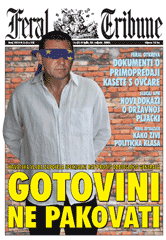

Keywords: Yugoslavia; Croatia; Dissidents; Communist System
The analytical framework for this discussion of the opposition, dissidents, and activities of opponents of the communist regime in Yugoslavia is derived from the typologies of the historian and political theorist Erhart Neubert.
More...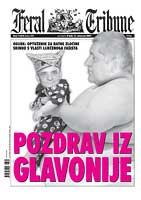
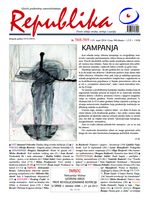
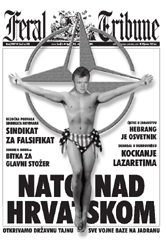

Keywords: political elite; political elite recruitment; Communist pattern of political elite recruitment; HDZ; SDP; founding election
The paper presents an overview of the emergence and shaping of the Croatian political elite at the beginning of the democratic transition over the period from spring 1989 to late August 1990, when the first Government (Executive Council of the (Socialist) Republic of Croatia) was dissolved. The introductory section defines the concept of the political elite and the fundamentals of examining its recruitment. Thereafter, the formation and the mode of recruitment of political elites in transitional countries is discussed. The main part of the paper examines the particular Croatian experience of the formation and recruitment of the political elite. The electoral winners in the first multi-party and founding election held in spring 1990 were elected based on legal rules and procedures introduced by the former, Communist government. The legislative branch of government was institutionalised through three Councils to which 351 representatives were elected from among more than 1.600 candidates. On the other hand, the executive was divided between the Executive Council (Government), Stjepan Mesić being the first Prime Minister, and the Presidency of the (Socialist) Republic of Croatia, as a collective body, presided by Franjo Tuđman elected to the post by a majority of votes of MPs.
More...Dušan Bilandžić Povijest Izbliza: memoarski zapisi 1945.-2005. (History Up Close: Memoirs) Prometej, Zagreb, 2006, 735 pages Dragutin Lalović Mogućnosti političkoga: preko građanina ka čovjeku (Possibilities of the Political. Via the Citizen towards the Man) Disput, Zagreb, 2006, 284 pages Enes Kulenović Sloboda, pluralizam i nacionalizam: politička teorija Isaiaha Berlina (Freedom, Pluralism and Nationalism: The Political Theory of Isaiah Berlin) Biblioteka Hrvatska politologija, Zagreb, 2006, 152 pages The political theory of Isaiah Berlin European Union, Nation-state and Future of Democracy Hrvatski politološki razgovori (Croatian political science talks), Zagreb, 27-29 October 2006
More...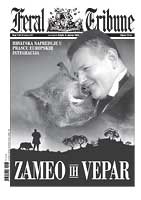

Keywords: Croatian Party of Rights; Croatian Defence Forces; Dobroslav Paraga; Political Parties; Homeland War
Based on the party archives, newspaper archives and literature recovery, the author presents the political programs and activities of the Croatian Party of Rights (HSP) from 1990 to 1992. This work analyzes the political aims of the party, the most important personalities associated with it during this period, the significance of its electioneering as well as of its results in the election of 1992. Once the multiparty system was established, HSP was rebuilt by Dobroslav Paraga and Ante Paradžik. The main party’s program was the establishment of an independent Croatian state. Political action of HSP resulted in political killings, political trials of leading party officials and the Party’s schism. The fundamental obstacle to renewal and further development of HSP was the Croatian Democratic Union and its attitude towards HSP.
More...
Many Croatian scientists have been interested in different and socially relevant issues regarding the general aspects of the knowledge based economy and society during last 15 years of social transformation. They investigated the issues from sociological, socio-cultural, socio-economic, political and social policy perspectives, as well from the starting point of recently developed informing science (IS) perspective. The paper focuses on conditions and processes currently present in Croatian research community.
More...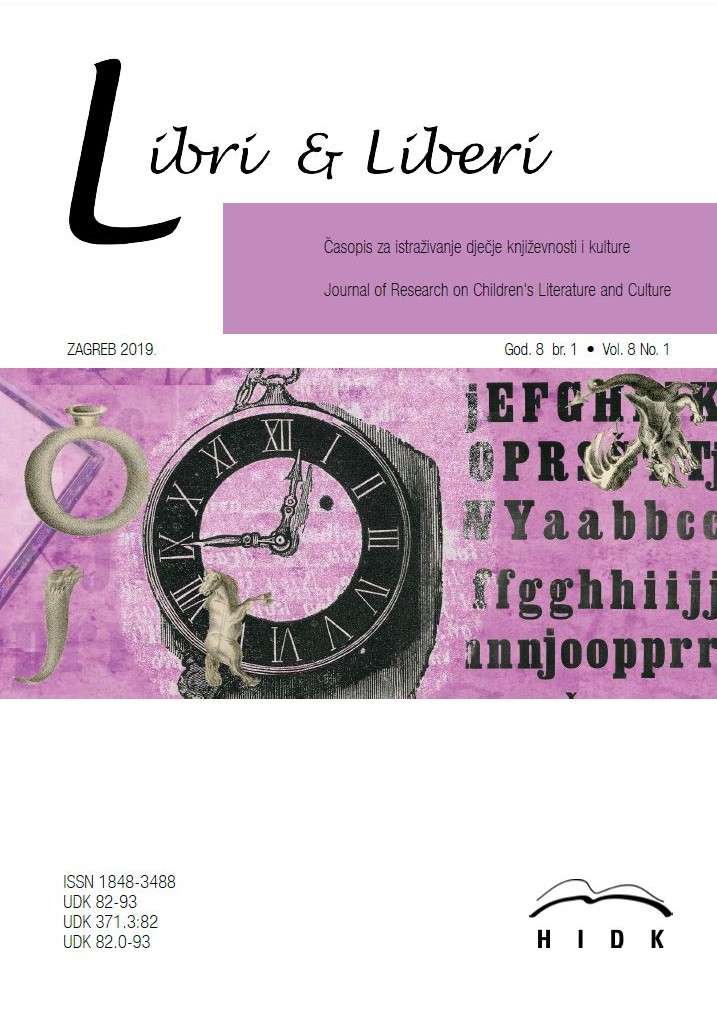
Keywords: translation; retranslation; Pinocchio; cultural context; socio-political context; ideology;
The paper looks into Croatian translations of Pinocchio, from its first translation, its later editions, to its retranslations in the 1990s and later. The term “retranslation” is used to refer to a new translation into the same target language of a previously translated work (Koskinen and Paloposki 2010). Pinocchio was first translated into Croatian in 1943 by writer and translator Vjekoslav Kaleb. This translation appeared in numerous editions after 1945 and is still being read by schoolchildren in Croatia. It co-exists with a number of retranslations, which appeared since 1996, in a completely different socio-political and cultural setting. The process of retranslation is interpreted with respect to the retranslation hypothesis. Translation as adaptation (Klingberg 1986) is also used as a theoretical basis for cultural content analysis. The aim of the research is twofold: (1) to establish possible differences between the first translation, its later editions (published after 1945) and the retranslations (published in the 1990s and later), which occurred due to the different sociopolitical context in which they appeared (see Pokorn 2012); (2) to identify culture-specific items, such as personal names, foodstuffs, regional expressions, etc., and to compare the solutions of the translators in different translations; the identified culture-specific units are analysed according to the level of domestication and foreignisation in the translations, and the reasons for retranslations are considered.
More...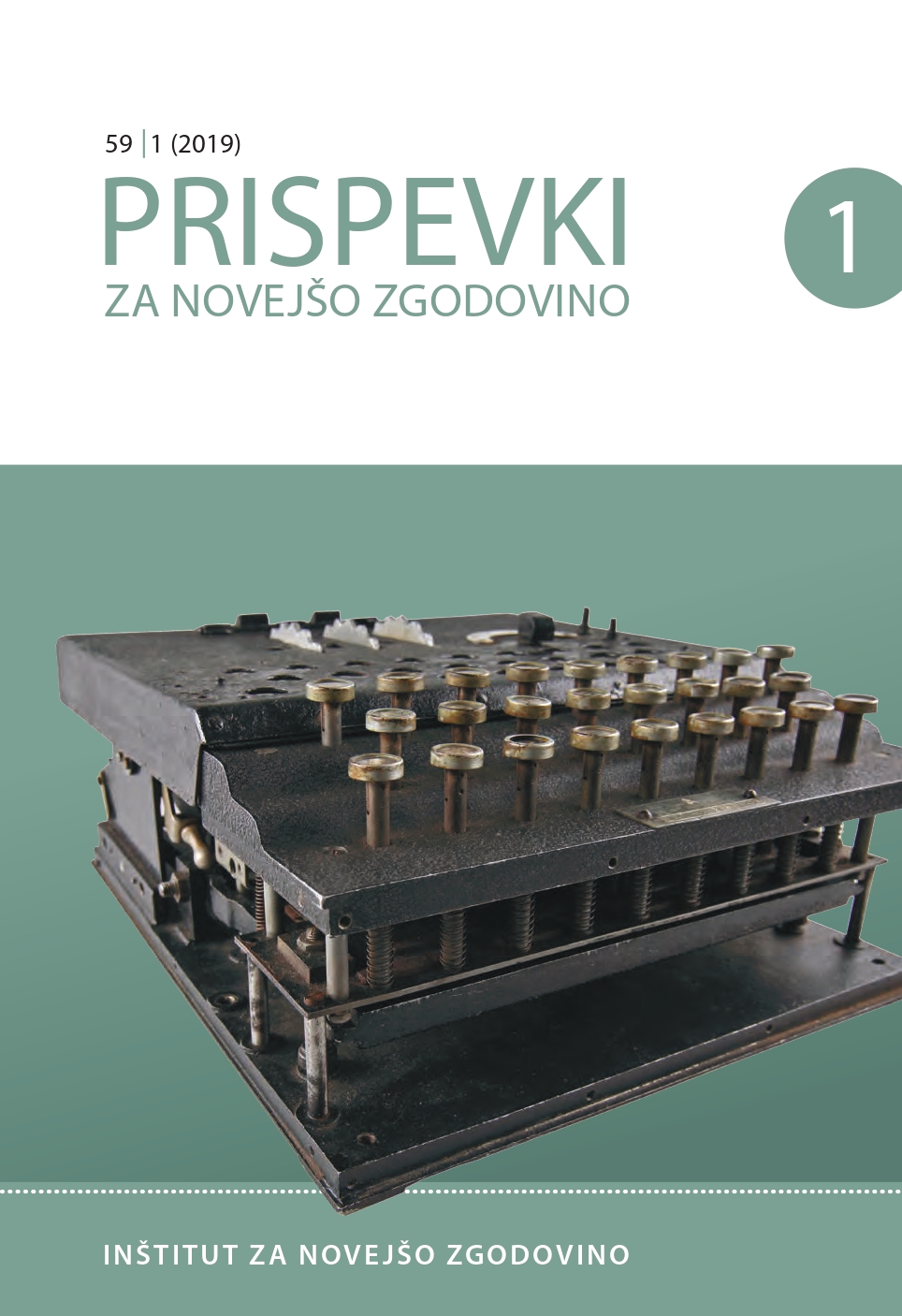
Keywords: parliamentary proceedings; corpus construction; language technology; corpus analysis;
The paper presents the Parlameter corpus of contemporary Slovene parliamentary proceedings, which covers the VIIth mandate of the Slovene Parliament (2014–2018). The Parlameter corpus offers rich speaker metadata (gender, age, education, party affiliation) and is linguistically annotated (lemmatization, tagging), which boost research in several digital humanities and social sciences disciplines. We demonstrate the potential of the corpus analysis techniques for investigating political debates. The corpus architecture allows for regular extensions of the corpus with additional Slovene data, as well as data from other parliaments, starting with Croatian and Bosnian.
More...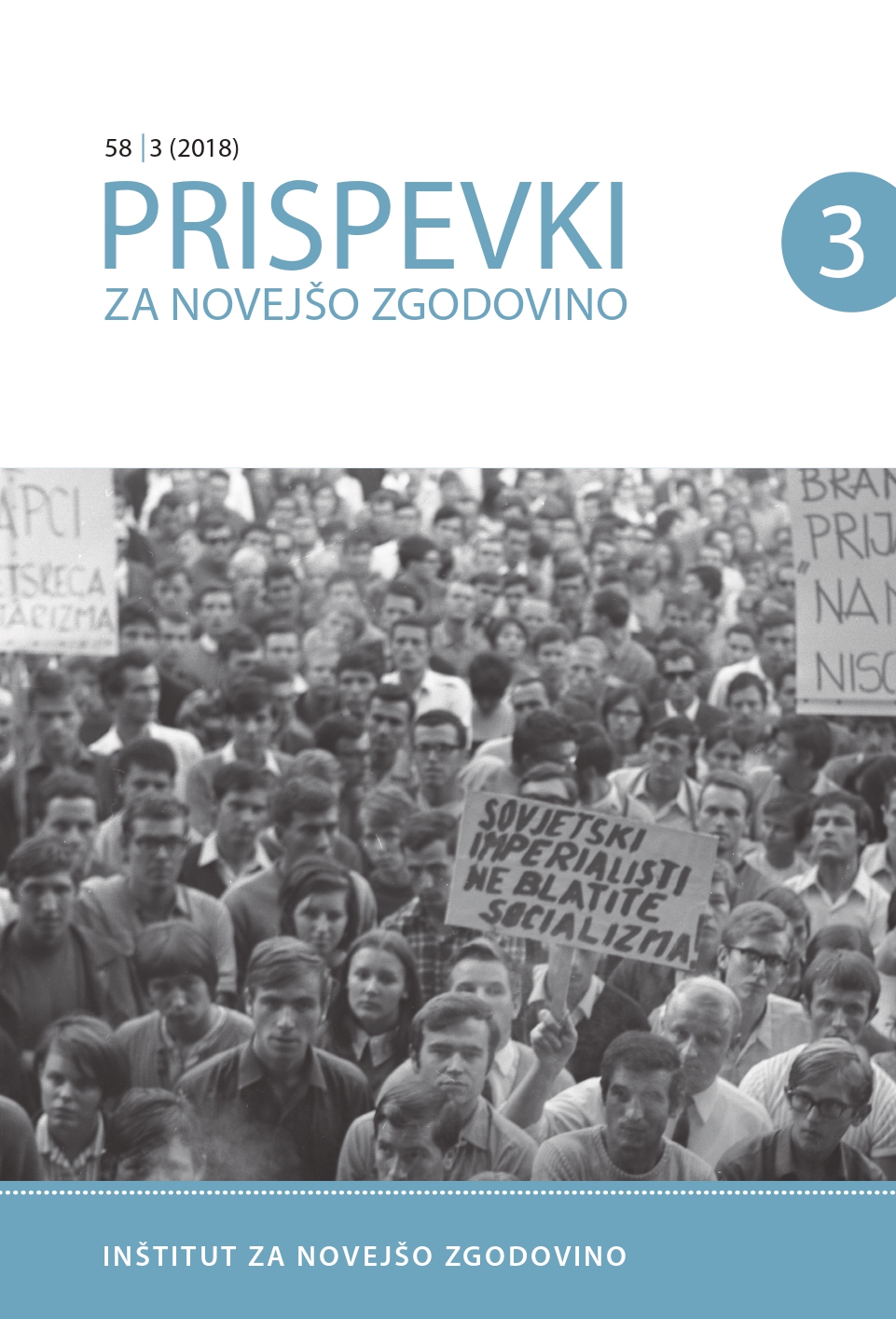
Keywords: Dissidents; Josip Broz Tito; Titoism; Yugoslavia; Communism;
The paper deals with the issue of the Yugoslav dissidents with regard to the system of communist governance and the functioning of the state led by Josip Broz Tito. In the wider context the role of critical intelligentsia – a culture of dissent – is analyzed within distinctive Yugoslav frameworks. The paper includes a shorter overview of the particularity of the Yugoslav dissidents, above all the differences in their perceptions, type of criticism, their mutual relations – as the opponents to the regime, and different destinies of individuals. Special emphasis was put on the West’s position of Yugoslav dissidents which differed considerably in comparison with dissidents from the Soviet Union and other states of real socialism.
More...
Keywords: Većeslav Holjevac; dissident; League of Communists of Yugoslavia; League of Communists of Croatia; Croatian Spring;
Croatian politician Većeslav Holjevac (1917–1970) has been remembered as one of the most successful mayors of the city of Zagreb. However, his character and political work are scarcely known to the public today. His merits in the cultural sphere are mostly forgotten, as well as the fact that he was one of the most important Croatian dissidents. His case delineates the issue of the Croatian national reform movement known as the Croatian Spring. Due to his solid character he was not afraid to defend his standpoints, even in the fights with communist comrades who were higher in the hierarchy of the League of Communists of Yugoslavia, which caused his political decline. The article presents the critical moments of his dissent and political disagreement with his comrades that led him to the role of the party renegade. The article also discusses the claims that Holjevac was to become the leader of the Croatian Spring.
More...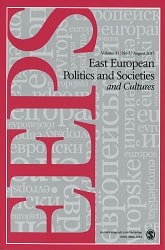
Keywords: LGBT rights; Nationalism; Balkans; Europeanization; human rights;
LGBT rights have come to be seen as allied with the idea of “Europe” and a European identity, particularly in the process of European Union enlargement to the East. Scholars have examined the ways in which external norms interact with more local, often “traditional” norms and identities. In this process, nationalism and conceptions of national identity and gender/sexuality norms can be seen as important factors that influence the domestic adoption of LGBT rights, particularly in the postwar Balkans. Croatia and Serbia (from approximately 2000 to 2014) present two interesting and different cases to analyze how discourses and dynamics of national and state identity construction, nationalism, and LGBT rights relate to discourses of “Europeanness” and European identity and how these affect the political dynamics of LGBT rights. This article finds that in Croatia, national identity was constructed in terms of convergence with European norms and identity, homonationalism was used to distinguish themselves from a “Balkan” identity, and there was a lower threat perception of the LGBT community framed primarily as a “threat to the family.” In Serbia, state and national identity was constructed in opposition to Europe and homosexuality had stronger threat perception, framed primarily as “threat to the nation.” In short, nationalism and national identity were less disadvantageous as a domestic constraint to LGBT rights in Croatia than in Serbia. The dynamics between nationalism and LGBT rights played out, for example, in the politics of the marriage referendum, Pride Parades, and public discourse more generally. This research contributes to the scholarship on LGBT rights and nationalism by empirically analyzing the different ways that nationalism, gender/sexuality, and European identity interrelate and influence LGBT rights change in a changing post-war identity landscape and how domestic constraints affect human rights norm diffusion.
More...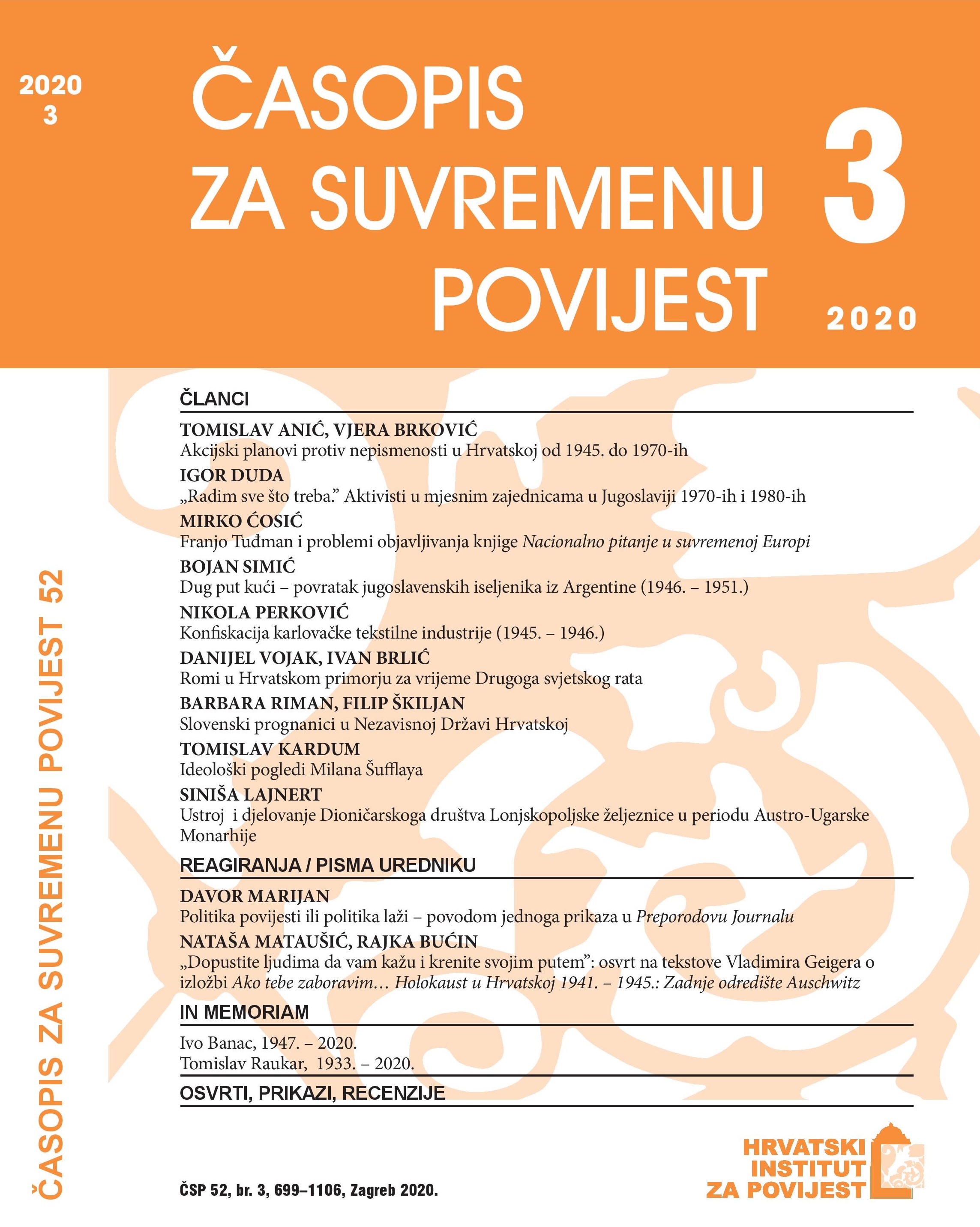
Keywords: Bogdan Radica; Franjo Tuđman; State Security Service (Yugoslavia); correspondence; Nacionalno pitanje u suvremenoj Europi;
Based on sources from various fonds of the Croatian State Archives, especially the documentation of the State Security Service of the Croatian Republican Secretariat of the Interior regarding Bogdan Radica and Franjo Tuđman and the correspondence between these two intellectuals who were kept under surveillance by the Service, the author presents the circumstances surrounding the initiative to print Tuđman’s book, Nacionalno pitanje u suvremenoj Europi (The National Question in Contemporary Europe), abroad. Namely, after criminal prosecutions in 1972 and 1981, Tuđman was forcibly removed from social life, pressured by the reality of Yugo-unitarism. The bold effort to publish his book despite all threats grew into an attempt to end his imposed isolation, which lasted until 1988, when he was accepted as a member of the Croatian Writers’ Association, after which he began to participate at public forums and, in 1989, published the book Bespuća povijesne zbiljnosti (Horrors of War: Historical Reality and Philosophy).
More...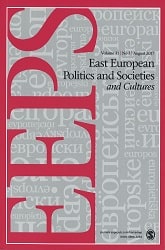
Keywords: Croatia; political history; 1970-1984; making of Croatian nation; Yugoslav ethnonational politics; Catholic Church; nationalist movements;
The contemporary Balkan crisis entails the consequential dimension of interaction between mainstream religion and Yugoslav ethnonational politics. Several studies that examined this aspect of the Yugoslav case, provided valuable information and important insights but hesitated to designate the mainstream Yugoslav religious institutions as agents of landmark mass movements. According to mainstream scholarship, religious organizations ordinarily operated as assistants to nationalist movements and populist regimes of late and postcommunism spearheaded by secular forces. [...]
More...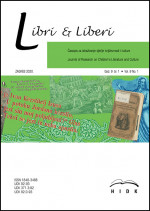
Keywords: Oliver Twist; paratext; retranslations; children’s literature; Croatian translation history;
The aim of the present study is to analyse paratextual elements in Croatian (re)translations of Charles Dickens’ classic social novel Oliver Twist; or, The Parish Boy’s Progress (1837–1839). We will explore the level of paratextual (in)visibility of translators in the (re)translations of Oliver Twist and observe how their (in)visibility might affect the reading and interpretation of the novel. The fact that Oliver Twist has been on the reading lists for Croatian primary schoolers ever since the early 1950s may account for the intense interest in the novel on the part of Croatian publishers. The first edition of Oliver Twist into Croatian appeared in 1901 and, since then, three (re)translations have been published, as well as a large number of reprints. The findings aim to contribute to a better understanding of Croatian translation history, shedding light on different approaches to translating children’s literature and the effects such translation practices may have had on the expectations of the target readership.
More...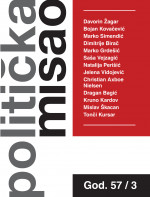
Keywords: Transformation; Privatization; Capitalism; Primary Accumulation of Capital; Nation-State;
The paper deals with various analyses by Croatian economists of the so-called process of transformation and privatization in the 1990s. In recent decades, especially since the first multi-party parliamentary elections in April 1990, the process of political-economic transformation has not only decisively changed the socio-economic structure of Croatia, but also influenced the Croatian polit-economic thought. By reviewing works by Croatian economists, political economists and sociologists, this paper has the ambition to make a contribution to a new approach of studying the process of transformation and privatization. This paper develops the thesis that the process of transformation and privatization was essentially a restoration of capitalism through primary accumulation of capital. What is also called wild capitalism, cronyism, and even tycoon capitalism – was in fact the usual course of the emergence and development of peripheral capitalism. Its specific feature is connected with the nation-state which had the role of system-maker as well as ruling-classmaker, rather than the other way around – that the ruling class had created its own state and economic system. At the same time, we reject as simplified various conclusions that the transformation and privatization process should have been and could have been more just and fair. In the end, one can better understand the paradox of Croatia starting the process of transformation and privatization as one of the countries with the best features and finishing as one of the most unsuccessful examples.
More...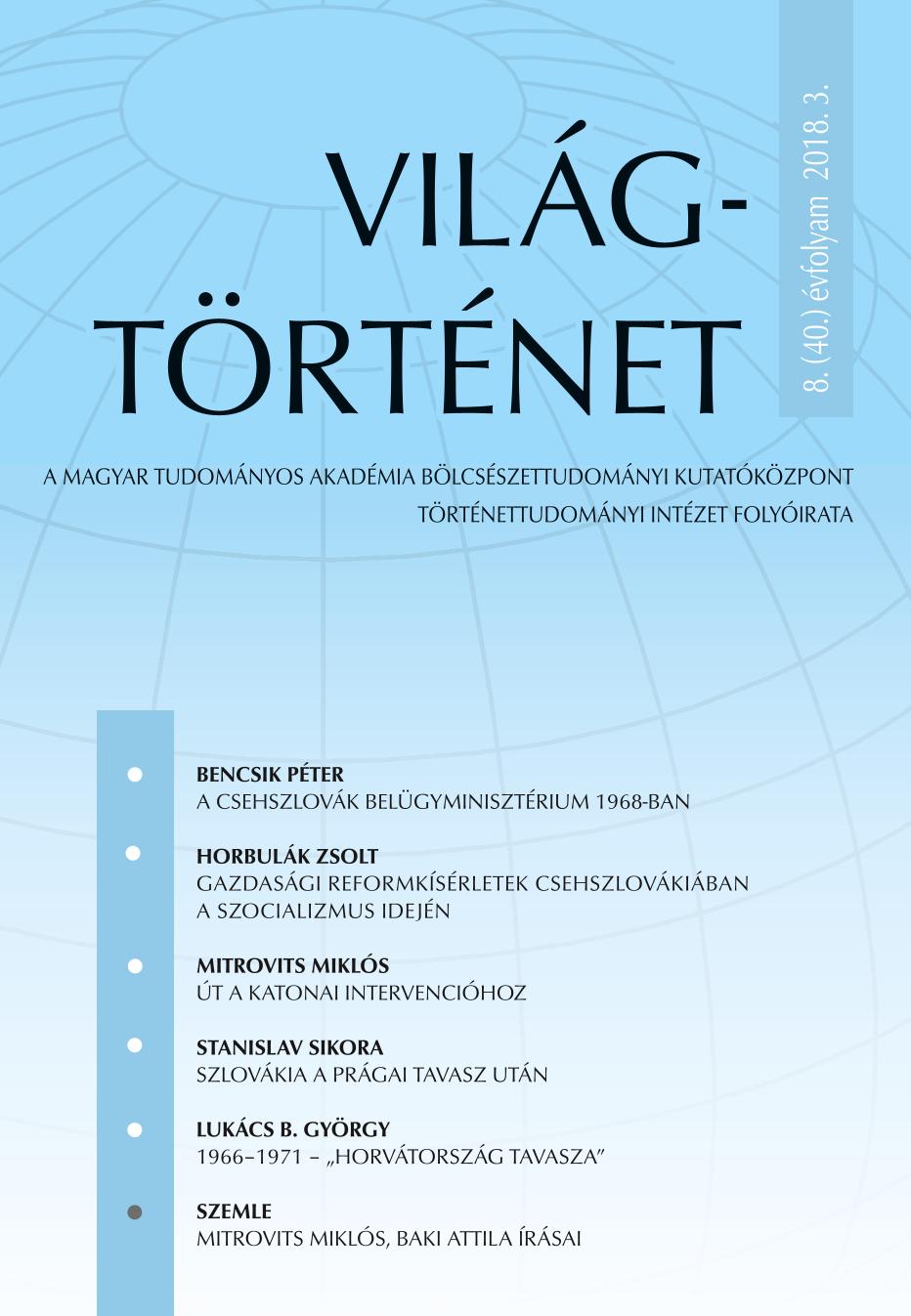
The study presents the Croatian reform movement in the second half of the 1960s, known as the Croatian Spring. In this era, Communist leadership in Yugoslavia, and as its part, in Croatia has been experimenting with reforms, which have brought significant economic, political and social transformation. The aspirations of the Croatian Communists were supported by most intellectuals and the Croatian society, the common goal being to increase the autonomy of the republic, to redefine its political, economic and cultural position in Yugoslavia. The paper presents the role of the most important Croatian cultural institution – the Matica hrvatska, the Croatian student movement and the Croatian political emigration. The changes to the federal constitution and the subsequent crisis in Croatia, the fall of the Croatian „reform Communist” leadership and the Croatian movement, are also presented.
More...